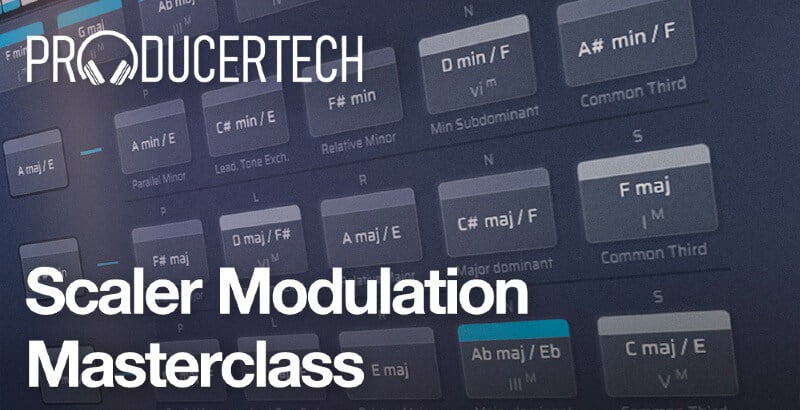
ProducerTech Scaler Modulation Masterclass TUTORIAL
Plugin Boutique’s incredible plugin Scaler, now in version 2.4, is an essential tool for any producer wanting easier and faster tracks to creating chords progressions, melodies and basslines in any key. The comprehensive modulation section also provides a number of modes for making chords sequences more exciting and dramatic, as well as helping transpose to different keys. This course explores each of the modulations modes, whilst providing complete workflows in 4 different musical genres: Neo Soul, Pop, Indie Dance and Drum & Bass.
The first module makes a Neo Soul arrangement in 2 different keys, from setting up the project and working out chords, to recording in MIDI notes for the 3 sounds in the track, covering every step along the way. The second module then focuses on secondary scale mode, using it to jam with sounds in different keys, to create a suitable vibe for a pop-style track. Secondary dominants are taught, as a way of moving to different chords in original and destination keys, then all parts are laid out in the arrangement.
The other 3 modes are all superb ways of coming up with engaging chords patterns, by using parallel scales, mediant chords or Neo-Riemannian techniques to create suitable flows. Module 3 uses modal interchange mode to make an Indie Dance groove, and module 4 employs the other 2 modes to make an old school DnB break.
All workflows are shown in Ableton Live, but all techniques are completely transferable to other DAWs. Furthermore, Live projects are supplied for all modules, with samples, MIDI patterns and Scaler sessions all provided in addition, for anyone working with other software. So, regardless of the DAW you use, this masterclass will help you fully grasp the powerful modulation capabilities of Scaler and give you the knowledge required to create interesting and musical tracks of your own.
Module 1 – Progression Mode
Rob creates a Neo Soul groove, by first coming up with a jazzy chords hook and then using progression mode to choose and then modulate to a new key, working out additional chords for seamlessly transitioning from one key to the next. Multiple instances of Scaler are used to sequence samplers in Live, so that MIDI notes for organ, bass and guitar can all be recorded into the arrangement.
Intro – 0.38
Lesson 1 – Creating the Chords Hook – 14.42
Lesson 2 – Working out keys in Progression Mode – 13.30
Lesson 3 – Arranging Sounds and Adding Transitions – 18.11
Module 2 – Secondary Scale Mode
Secondary scale mode is used from the outset to jam with sounds in different keys until a suitable combination is found for making a Pop-style track. A hook is then created in original and destination keys by utilising secondary dominants. Parts are then sequenced in the arrangement to lay out a verse and chorus, with 2 different techniques for creating melodies shown at the end of the module.
Intro – 0.39
Lesson 1 – Jamming with keys in Secondary Scale Mode – 10.38
Lesson 2 – Creating Hooks using Secondary Dominants – 17.43
Lesson 3 – Arranging Parts – 13.56
Lesson 4 – Techniques for Making Melodies – 25.16
Module 3 – Modal Interchange Mode
Rob shows how modal interchange mode can be used to come up with interesting patterns that incorporate borrowed chords, either starting with chords and then adding bass, or working in the other direction. Sounds are then sequenced in the arrangement to form an Indie Dance groove.
Intro – 0.27
Lesson 1 – Modal Interchange Mode – 20.31
Module 4 – Mediants and Neo-Riemannian Modes
The final 2 modulation modes in Scaler are used to come up with chords for drop and breakdown sections of a DnB track. Mediants is used initially for the main chords, so that synth and bass sounds can be sequenced within Scaler, after which Neo-Riemannian is used to sequence strings and a sub instrument in Live, to form a contrasting intro or breakdown.
Intro – 0.38
Lesson 1 – Mediants Mode – 12.48
Lesson 2 – Neo-Riemannian Mode – 10.59
